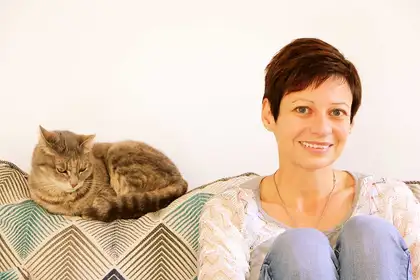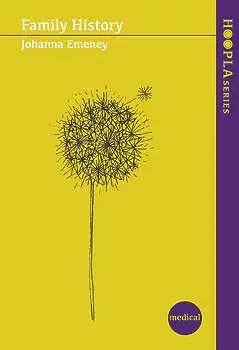
Poet Dr Johanna Emeney with her cat.
The death of a parent was the spark for creative writing tutor and award-winning poet Dr Johanna Emeney’s newest collection, which illuminates the languages of poetry and medicine.
Family History is one of three books in this year’s Hoopla series, just published by Wellington’s Makaro Press. Hoopla also includes Dylan Junkie by Jeffrey Paparoa Holman and Wolf by Elizabeth Morton. All three are being launched on Thursday, May 4 at Takapuna Library, Auckland, by renowned poet C. K. Stead.
Her PhD supervisor Associate Professor Bryan Walpert’s poetry collection Native Bird was published in the same series in 2015.
In her second collection, Dr Emeney, who teaches in the School of English and Media Studies at Massey’s Auckland campus, brings her family history to the page – in all its uniqueness and ordinariness – and challenges the medical approach that can forget the person inside the patient.
Her poems focus on how a family’s history turns on its head when a mother is diagnosed with breast cancer. Beyond the shock of discovering the disease, there are questions raised about genetics – all the more difficult when the mother is an adoptee. The rural family is also quickly overwhelmed by the city-based clinical world they find themselves in and the way it depersonalises the central figure in their lives.

Q & A with Dr Emeney about her new book:
Q: When did you write the poems in this collection?
A: I wrote most of them during my Creative Writing PhD at Massey. My supervisors [academics and poets] Bryan Walpert and Jack Ross, were instrumental in helping me to shape the collection and to understand what I wanted it to say and do.
Although the main story of the collection is my own and my mother’s, some of the poems were written for my first publisher and my friend Chris Cole Catley. I was privileged to be allowed to continue visiting her towards the end of her life, and she used to like a new poem to accompany me on every visit.
After she died, I also wrote poems about that experience – not to make sense of it, but to honour it.
I had always dreaded my mother’s death from cancer but, as it turned out, she was killed in a car accident. I did not have that long-dreaded experience. Instead, it was a different kind of grief. Chris and her family allowed me to be very close to terminal illness, and it shrank my fear.
Q: Your poems show how the arts and humanities can engage with science and medicine – have you been doing more writing in this area?
A: I am just finishing a book for Ibidem Press (Janet Wilson is the editor) called The Rise of Autobiographical Medical Poetry and the Medical Humanities. Routledge has also recruited me to write a chapter for their forthcoming Companion to Literature and Disability called ‘Disability and Contemporary Poetry’. I am excited to work on a project in Disability Studies (although the word “disability” rankles) because it is a relatively new area of study, and one that will ensure that I am researching really assiduously to produce good scholarship.
Q: Were these poems difficult to write and refine from an emotional perspective? Or did writing them help you to understand, digest, and cope with what must have been a painful time?
A: I never find poetry difficult from an emotional perspective; I always find it helpful. However, as Harry Ricketts said in a recent talk in Christchurch, one has to be careful not to write hagiography when one is depicting a beloved figure – in this case, my mother.
Q: What do you think this collection can tell a reader about how we might view the interactions between the body, illness, the medical world, death?
Primarily, I hope to make clear in this book how important it is that the patient is treated as a person within the clinical context. In all of the personal medical encounters that I have had and witnessed, on the whole, I have found nurses to be more adept at this than specialists, and the collection reflects this.
I think that in this age of oncogenomics (a personalised medicine tailored to the types of cancer that an individual has) we should be able to expect a medicine that is also tailored to the individual in whom the disease resides. It should take into account his or her nervous family members, his or her desire for counselling adjuvant to physical therapy, his or her wish to know all of the possible side effects of drugs with no euphemisms.
The collection also presents a very pro-euthanasia stance, which is one that I still adopt.
Q: What are you doing these days?
A: I teach Creative Writing internally and by distance at Massey, and also co-facilitate the Michael King Young Writers Programme with my friend Rosalind Ali. Both of those jobs satisfy my love of teaching. Ros and I have just made enquiries at Paremoremo Prison about doing some writing workshops there, as we were inspired by the work [Dr] Rand Hazou has recently undertaken in drama there, and we like to do something in the community a couple of times each year. Usually, it is writing with older adults or the migrant community, but we thought that this year we might try something different.
Q: Do you have any favourites in the collection?
A: ‘Night Nurses’ is a favourite, because it celebrates some of the best people – those who do things for others ‘behind the scenes’. In this case, the night nurses who often tend sleeping people who can neither do the nurses grand favours in return, nor report their fine deeds to others in a public forum. Generally, it would be true to say that these nurses do a beautiful job of caring for others’ brothers, sisters, mothers and fathers because they love people, not because they seek recognition. As they are presented in the poem, they represent a kind of humility that I admire a great deal.
Night nurses
appear at curtains
in cameo profile,
nod to obs sheets,
tick boxes.
The night nurses
pickpocket pulses
from bedsheets,
slide and turn
whole bodies
from pain
to comfort.
In the light,
their names
will be forgotten –
like the sound
of their kind shoes
on linoleum,
their answers
to muddled
midnight questions,
the nightmare admissions
taken in their stride.